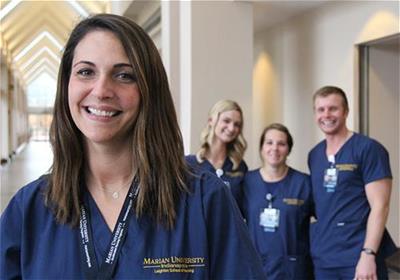Blog
Nurses Need Liberal Arts Courses
By Dorothy Gomez, PhD, RN-CNE | April 10, 2017
 I have been educating nursing students for many years at Marian University. I primarily teach our younger nursing students in the traditional Bachelor of Science program, but I've also taught adults in the second degree Accelerated BSN program and in our RN to BSN track. As a Catholic university, Marian has foundations in the Franciscan and liberal arts traditions. And yet, it seems as though the liberal arts course requirements are what I find puzzles these nursing students the most. They often ask, "Why do I need to take history, theology or courses in the arts? I don't need this to be a nurse." My response is similar to what I believe Florence Nightingale would have said; "Nursing is an art and a science, and it is the art that makes a good nurse a great nurse."
I have been educating nursing students for many years at Marian University. I primarily teach our younger nursing students in the traditional Bachelor of Science program, but I've also taught adults in the second degree Accelerated BSN program and in our RN to BSN track. As a Catholic university, Marian has foundations in the Franciscan and liberal arts traditions. And yet, it seems as though the liberal arts course requirements are what I find puzzles these nursing students the most. They often ask, "Why do I need to take history, theology or courses in the arts? I don't need this to be a nurse." My response is similar to what I believe Florence Nightingale would have said; "Nursing is an art and a science, and it is the art that makes a good nurse a great nurse."
Think about what a nurse needs to accomplish every day. Nurses need to monitor vital signs, lab values, clinical manifestations and physical response to medications and treatments; all very scientific. It would be easy if the nurse did not have to put in to the scientific equation the greatest variable—the patient! The patient needs a nurse that individualizes their care, that sees beyond the numbers, and that can explain things. They also want a nurse that can anticipate their feelings, provide hope and meet their cultural and spiritual needs. I believe a liberal arts education provides the student with the tools to confidently meet the needs of the patient with each encounter.
Nurses give reports every day to other nurses and health care professionals. This communication is essential to maintain the quality of patient care and provide a smooth safe transition of care. How do nurses become a good storyteller? The best way is to start by reading great literature. In a liberal arts education, the students have an opportunity to read and analyze literature and create writings that express their views. They need to be able to tell a story.
Nurses communicate with patients from diverse populations, and they learn about a world of differences by analyzing the history of the world, by studying a foreign language, and by experiencing many cultures and traditions. These concepts are all taught in a strong liberal arts program of study. By studying a foreign language, students experience the difficulties of expressing needs in a language other than their own. They learn the frustration of trying to be understood. In addition, a school strong in the liberal arts often provides study abroad opportunities for students that immerse them in a different culture. Colleges with a religious foundation like Marian also gives students the opportunity to learn about serving populations in need, and to appreciate the world and its people.
Having a broad background in humanities for the nursing major provides them with an incredible advantage in their career. It will lead to a life rich in individual encounters, where the nurse can make a difference. I believe that the study in the liberal arts helps the nurse see the patient holistically and to see themselves as part of the equation. Although the field nursing has an advantage over other majors—when you study nursing you become a nurse. As a nursing educator and a firm believer that the liberal arts make a better nurse, we need to do a better job at linking a liberal arts study to the scientific nursing education. Because in the end the scientific facts are important, but it is the way the patient feels and is understood that really matters.
Tweet© 2021 Marian University
Notice of Nondiscrimination
Marian University does not discriminate on the basis of race, ethnicity, color, sex, gender, gender identity, sexual orientation, religion, creed, national origin, age or disabilities in the selection
of administrative personnel, faculty and staff, and students.
*Placement rates are gathered from data collected from graduates within six months of graduation.
Students may make a complaint to the Indiana Commission of Higher Education.
Marian University is sponsored by the Sisters of St. Francis, Oldenburg, Indiana.
Submit a Marketing Request
Website built with